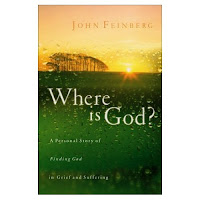Where is God?

I just finished Where is God? A great book by John Feinberg, professor at Trinity Evangelical Divinity School, about how he dealt with and processed his wife’s battle with Huntington’s Disease. As he watched his wife deteriorate mentally and physically over many years of marriage, he finally came to a point where he put into writing some of the things he was dealing with as a follower of Christ struggling to make sense of seemingly needless pain and suffering–a question that we’ve all dealt, or will deal with, at some point in our lives.
One of the best takeaways from the book was John’s explanation that more often than not what the sufferer needs is not a philosophical discussion about the problem of evil, but rather pastoral care. Here he used a great analogy:
Think of a little girl who goes out to play on a playground. Sometime during her play, she falls and skins her knee. She runs, screaming in pain, to her mother for comfort. Now, her mother can do any number of things. She may tell her daughter that this happened because she was running too fast and wasn’t watching where she was going; she must be more careful next time. The mother might even explain (if she knew them) the laws of physics and causation that were operating to make her child’s scrape just the size and shape it is. The mother might even expound for a few moments on the lessons God is trying to teach her child from this experience.
If the mother then asks her daughter if she understands, don’t be surprised if the little girl responds, “Yes, Mommy, but it still hurts!” All the explanation at that moment doesn’t stop her pain. The child doesn’t want a discourse; she wants and needs her mother’s hugs and kisses. There will be time for the discourse later; now she needs comfort.
The same is true for each of us as we struggle with the religious problem of evil. When the affliction first comes, we don’t want or need a lengthy discourse to appeal to our mind, and that is so because this isn’t primarily an intellectual matter. Even if you have something absolutely profound to say about the situation and you say it, don’t be surprised if we are too hurt and confused to absorb it. We need someone to let us pour out our heart, not someone to give us a lecture, regardless of how brilliant and instructive it might be (p. 26).
I definitely recommend Where is God? for anyone struggling to understand where God is in the midst of pain. John has great insight from years of processing what God was doing in his wife’s situation. Check it out.